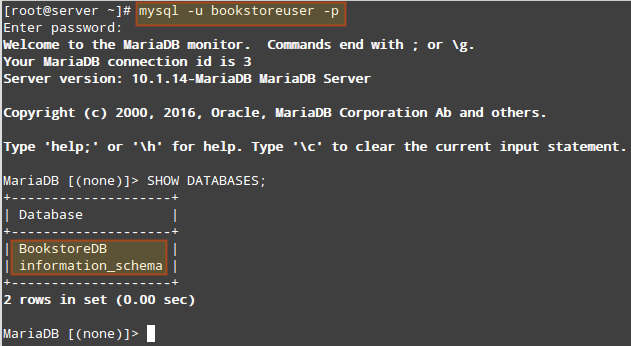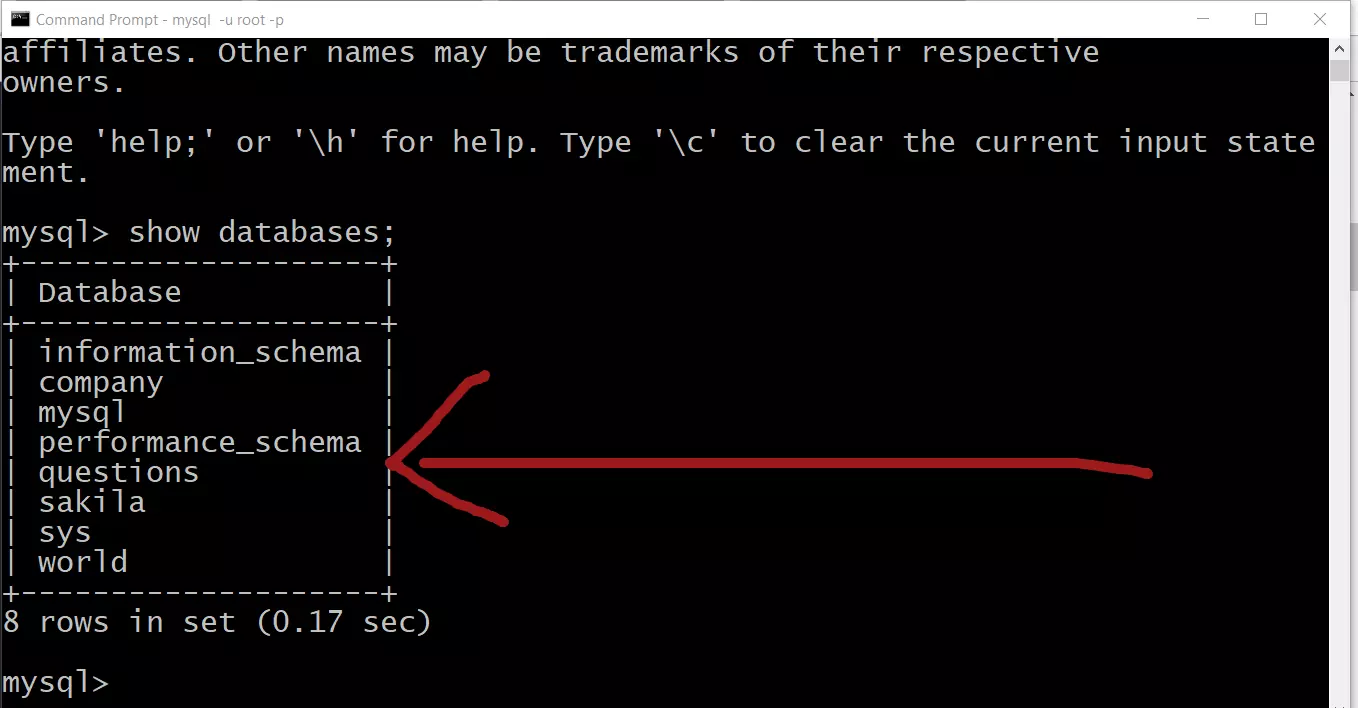

- #Mysql show databases cli install
- #Mysql show databases cli update
- #Mysql show databases cli password
I am going to show you three different methods to get the lists using GUI. Hence, we can use mysqlshow for checking the existence of a database. You might find it useful to list all the views/tables in a particular database. Mysqlshow: Unknown database 'nonexistingDB' Let’s also check a non-existing database and see the result: $ mysqlshow -user user -host localhost -socket /tmp/ nonexistingDB The exit status of the command execution was 0. The output of running mysqlshow listed the tables in the database. Finally, we specified the students database. The –socket option’s the socket file to connect to the server. The –host option’s for specifying the host on which the MySQL server is running. We specified the user to connect to the MySQL server using the –user option. So I created a docker-entrypoint.sh which copy wanted files to my volume when I start the container : #!/bin/bashįinally, my docker-compose.Let’s inspect it with an example: $ mysqlshow -user user -host localhost -socket /tmp/ students RUN ln -s /usr/local/bin/docker-entrypoint.sh /entrypoint.sh # backwards compatĪs I said, I wanted to be able do deploy a new container easily. SHOW DATABASES To list all databases in the MySQL database server, first log in to the database server as follows: mysql -u root - p It will ask you for the root password.

& sed -i -e s/ssl_version=PROTOCOL_SSLv3/ssl_version=PROTOCOL_SSLv23/ /usr/local/lib/python2.7/dist-packages/gevent-1.1b3-py2.7-linux-x86_64.egg/gevent/ssl.pyĬOPY docker-entrypoint.sh /usr/local/bin/ The easiest way to list all the databases available in MySQL is by logging into the MySQL server using mysql client and issuing SHOW DATABASES command.
#Mysql show databases cli install
RUN apt-get install -y python-setuptools python-dev \ Most people would put the docker DB related variables into the environment of the docker container so do this: sudo docker exec -it containername env.
So you need to find them then do this: mysql -P#Mysql show databases cli update
RUN apt-get update & apt-get install -y ajenti cron unzip ajenti-v ajenti-v-php-fpm ajenti-v-mysql ajenti-v-nginx In my case I was confused because docker used a different host and port. RUN echo "deb main main debian" > /etc/apt//ajenti.list RUN apt-get update & apt-get install -y wget It will generate a diagram with relationships. SELECT DB,USER,HOST,STATE FROM INFORMATIONSCHEMA. Either you select the tables you want to understand or choose the entire DB. From the monitoring context here is how you can easily view the connections to all databases sorted by database. Click on Reverse Engineer option somewhere you find under the tools or Database menu. RUN apt-get update & apt-get install -y -q mysql-server php5-mysql You need to open it and choose the database you want to reverse engineer.
#Mysql show databases cli password
RUN export DEBIAN_FRONTEND=noninteractive \Įcho mysql-server mysql-server/root_password password $MYSQL_ROOT_PASSWORD | debconf-set-selections \Įcho mysql-server mysql-server/root_password_again password $MYSQL_ROOT_PASSWORD | debconf-set-selections RUN apt-get update & apt-get install -y -no-install-recommends \ So here is my Dockerfile : FROM php:5.6-fpm The host work with an nginx reverse proxy which redistribute websites on correct container. I am developing a standard docker container for web hosting production environnement. So here is the first way I can connect to mysql into the container : docker exec -it M圜ontainer mysql -uroot -pMyPasswordīut If i access from : mysql -h localhost -P 3308 -u root -pMyPasswordĪnd the result of docker ps CONTAINER ID IMAGE COMMAND CREATED STATUS PORTS NAMESĪ0de6a691d72 M圜ontainer "docker-entrypoint.sh" 3 hours ago Up 3 hours 9000/tcp, 0.0.0.0:8085->80/tcp, 0.0.0.0:3308->3306/tcp, 0.0.0.0:8084->8000/tcp, 0.0.0.0:8086->8080/tcp M圜ontainer But when I connect from the host to the container mysql process, It seems to show me the mysql datas from the host machine, not from the container one. It's working well, but what I can't figure out, is why I can't see any datas from my container?įrom inside the container, I have a test databases which I can connect to without any problem. Mysql -h localhost -P 3308 -u root -pMyPassword A user account in MySQL consists of a user name and host name parts. I can access to mysql from the host like this : I launch my docker with docker-compose, and my compose file is mapping 3308 host port on 3306 container port. It's my own dockerfile which install a database expose on port 3306. I am trying to access mysql databases from my docker host to the container.


 0 kommentar(er)
0 kommentar(er)
